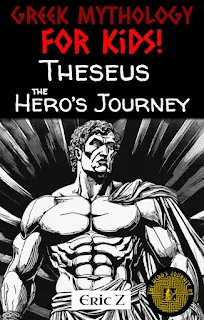This action-packed adventure follows young Theseus as he embarks on a perilous quest to uncover his true identity and claim his birthright.
P.S. For Teachers and Psychologists:
Theseus Embodies the Hero Archetype: A Jungian Analysis:
From a Jungian perspective, Theseus's journey can be seen as a classic example of the hero archetype. The hero archetype is a universal, innate pattern in the collective unconscious that represents the journey of individuation, the process of becoming a whole and integrated individual.
Call to Adventure: Theseus's call to adventure begins with his desire to learn the identity of his father. This longing for his father represents a desire for wholeness and a sense of belonging. The act of lifting the rock to obtain his father's sword and sandals symbolizes the initial step in overcoming his unconscious obstacles and embarking on the path of individuation.
Trials and Obstacles: Theseus faces a series of trials and adversaries on his journey to Athens. Each encounter represents a symbolic confrontation with aspects of his own shadow self - the unconscious, often repressed aspects of the personality.
Periphetes, the Club Bearer, embodies brute force and aggression.
Sinis, the Pine Bender, represents cruelty and the destructive aspects of nature.
The Crommyonian Sow embodies chaos and the untamed instincts.
Sciron, the Giant, represents arrogance and the abuse of power.
Cercyon, the wrestler, represents physical strength and the need to balance it with skill and intelligence.
Procrustes, the Stretcher, embodies the desire for conformity and the dangers of forcing others to fit a mold.
The Final Test: Theseus's final test occurs when he arrives in Athens and encounters Medea. Medea, a powerful witch, represents the archetype of the terrible mother, who seeks to maintain control and prevent the hero from achieving his full potential. Medea's attempt to poison Theseus symbolizes the dangers of succumbing to the shadow self and the importance of remaining true to one's path.
Reunion with the Father: The reunion with King Aegeus represents the successful integration of the conscious and unconscious aspects of the personality, leading to a sense of wholeness and completion. The recognition through the sword and sandals emphasizes the importance of symbolic objects as representations of the unconscious.
The Hero's Return: Theseus's ascension to the throne signifies the culmination of the individuation process. [38] He is now a mature individual, capable of leading and guiding others. His journey emphasizes the importance of confronting and integrating one's shadow self in order to achieve wholeness and fulfill one's potential.







No comments:
Post a Comment